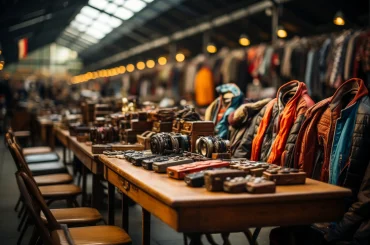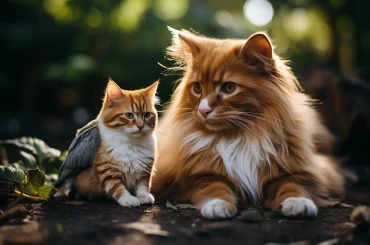City living encourages conscious decisions. Taking a stroll down the busy metropolitan streets can often feel like walking through an endless corridor of glitzy shop windows and tempting offers, making it hard to resist the allure of a consumer-driven frenzy. Yet somewhere in between all this hustle lies an important truth: with every purchase we make comes immense power that allows us to act consciously and choose products aligned with our deeper principles.
This is where ethical consumption becomes relevant for urban living. In today’s skyscraper jungles and ever-growing avenues, how do you tap into your ability as a conscious consumer? How do you buy better while keeping your purpose in mind?
Let’s take a stroll together to explore the concept of ethical consumerism. It goes far beyond common phrases and involves making decisions rooted in values instead of just selecting items based on their practicality or looks. We should be asking ourselves questions like: What are this item’s origins? Who made it, and what cost would there be for our environment or society if we bought it? This practice holds tremendous significance when considering how each purchase can shape our world today as well as tomorrow.
Living in the city gives you tremendous potential to be a major force for change. One day, I was struck by how powerful something as simple as what I buy can be—it’s like casting my vote in favor of or against whatever product or service is being purchased. If more and more people become aware that their choices have consequences beyond just themselves, we could all make crazy big impacts on businesses large and small, from making sure corporate policies are ethical ones to encouraging innovations with sustainability at their heart. Each one of our purchases might actually make some real difference!
The challenge here isn’t only about getting educated when shopping but rather taking an honest look within ourselves first and finding ways to ensure that what we choose aligns with the values held close.
Over the years, I’ve come to see that there ought to be a match between my principles and what I spend money on; this can either end up in an enormous difference or show how much my values mean.
Vital Elements of Ethical Consumption for City Dwellers
Sustainable Collection and Making
I used to mindlessly shell out cash for the latest thing on store shelves without thinking twice about where it was coming from or how it had been produced. However, as consumerism began losing its charm for me, suddenly reality hit like lightning!
Every item has a narrative behind it, from raw materials to the finished product. As city dwellers, we all must be aware of these stories.
Deciding on goods made with eco-friendly components isn’t just an environmentally responsible decision; it goes against severe deforestation, water contamination, and wasteful practices that damage our planet. For instance, I once had a stunning wooden bowl in my home but later felt bad because I wasn’t sure if its wood was sourced sustainably. My journey into the world of sustainable shopping made me realize how important it is to look further and make sure that the goods we get have stories connected with sustainability. But being sustainable isn’t only about saving our planet; there is a human element too. During my experience, I advocated for those companies that can sustain not just environmental balance but also provide fair labor practices to their employees, meaning making sure they are handsomely paid for their hard work, ensure safety conditions at the workplace, and receive respect as individuals in general. Moreover, when it comes to smaller business establishments like an old-fashioned bakery run by an elderly couple located in one corner of my city, there is nothing better than supporting them locally both financially and ethically!
I made a great discovery when I stumbled across this bread shop. Not only did it have delicious loaves, but the people behind them were dedicated to supporting their local region and farmers in particular! It was clear that every loaf had been kneaded with love. Buying from these artisans felt not just like getting my hands on some yummy baked goods but also like being part of something bigger.
When you choose to back homegrown businesses or producers, everybody wins! You get your goodies delivered quickly (no long-distance shipping required) and help keep money circulating within the community, so everyone benefits from economic growth too.
Whenever I buy from local artisans, I imagine it’s like planting the seeds of success in my own backyard.
Staying Away from Fast Fashion and Opting for Quality Over Quantity
I was once totally captivated by fast fashion—endless rows of stylish clothes that kept getting updated over time and were too tempting to ignore. But then one day, when I realized how fleeting these options are as well as what a huge impact they have on our environment, everything changed for me.
Once you understand all the ethical and ecological implications associated with fast fashion, its appeal tends to dim drastically. It has a lot of hidden costs, such as the exploitation of labor forces and astronomical amounts of clothing that end up being dumped carelessly all around us.
Overcoming Challenges in Ethical Consumption in Urban Areas
Navigating Price Points and Affordability
Figuring out how to afford ethical consumerism was one of the biggest hurdles I encountered on my journey with this lifestyle change. Instead, I figured out a way to invest in timeless pieces that might have higher price tags but could last much longer than any fast-fashion item ever would—it made me feel like planting a tree right there in my own backyard! The satisfaction of having fewer beloved items felt far more rewarding than the fleeting happiness derived from disposable ones, even if they came at cheaper prices.
The idea that ethical choices are only for the elite or those with lots of money was something I used to believe too. But when you look further into it, things aren’t always as they appear on the surface. I’ve come to learn that while ethically made items may have a higher price tag at first glance, their better quality and longer life expectancy often make them more cost-effective in the long run. So don’t be discouraged by what looks expensive; take a closer look!
I can recall the moment I first saw that organic cotton shirt and hesitated to purchase it. It was much more expensive than other similar items, so naturally, a part of me questioned its worth. But as time has shown since then, my hesitation turned out to be unfounded; this particular item has lasted far longer than anything else in my closet! Looking back now at what felt like an unlikely investment—both from personal and ecological points of view – makes me realize how beneficial taking on an ethical mindset really is.
It’s not just about buying ‘ethical products’ though; it’s also about considering our true needs versus wants before we buy something new. When you think of value beyond mere money spent here or there and instead focus on the real impact each decision will have—for ourselves and for others around us—spending wisely suddenly becomes plausible rather than impossible! Discerning Genuine Ethical Brands from Greenwashing As ethical consumerism gains popularity, a new issue has come up: the problem of greenwashing. Companies are attempting to capitalize on this trend and make huge claims regarding their sustainability or good practices. I’ll never forget my shock when a brand that I had been devotedly backing for its “green” statements turned out to only have superficial obligations.
It became evident that being an educated ethical shopper demanded more than just looking at product labels; it necessitated a much deeper examination of what was going on behind the scenes. Have you ever encountered similar situations? How do you go about determining which companies genuinely abide by ethically sound principles? My journey towards ethical consumerism
As I made my way through the confusing maze of modern-day shopping, certifications like Fair Trade, Organic, and Rainforest Alliance became my guiding lights. These provided me with assurance that genuine ethical practices were being followed. But beyond these verifications, I also joined forums to engage in conversations and learn more from a committed community on responsible consumption habits.
The stories shared by friends played an important part too; one such recollection was when they visited a local brand’s workshop, which actually practiced what it promised! Experiences like this kept reaffirming my faith as well as helping differentiate actual commitments from promotional ploys. Staying on Top of the Constantly Evolving Consumer Landscape The ethical consumerism sphere, much like anything else out there, is constantly in flux. As cities evolve and grow quickly around us, we may find ourselves having to keep up with a slew of new brands popping up frequently while also staying informed about any alterations or shifts taking place within the industry. To stay in the know I took it upon myself to build my own network, one comprised primarily of individuals as well as organizations, all sharing similar interests and beliefs regarding sustainability practices and other issues alike.
I started by attending various workshops in different venues, from learning more about an existing brand’s values to being exposed to completely novel concepts that had yet to come to fruition. Getting involved also included signing up for emails when available from certain companies so that I could always be updated on their latest initiatives and offerings, not forgetting engaging actively during local events that were focused mainly around the topics at hand.
Each step along this path felt just like another piece added to my jigsaw puzzle: each interaction was enriching me with fresh knowledge whilst providing me with unique perspectives, especially once combined together, they constituted what ultimately empowered me immensely! It’s amazing to observe the surge of platforms, both physical and digitalized, that assist this collaborative learning. Ethical customer discussion boards, temporary operations displaying eco-friendly brands, and documentaries about mindful spending contributed a great deal to maintaining my information up-to-date and sustaining my loyalty uninterrupted.
Useful Actions for Starting Your Responsible Spending Adventure
Learn More About It
The beginning of my responsible shopping journey was much like planting a tree. I wished it were so but just needed additional guidance—knowledge in particular.
I used to think that just making a couple of green choices was enough, but I now understand the tremendous scope of what ‘ethical’ really is.
Reading has become my go-to pastime. Books such as “The Conscious Closet” by Elizabeth L. Cline or “Overdressed: The Shockingly High Cost of Cheap Fashion,” written by the same author, were eye-openers; they uncovered how bad consumerism had gotten and gave practical tips on how we can make it better. Then there’s documentaries like “The True Cost”, which showed me more than just the environmental damage done by fast fashion; it also highlighted its societal effects too!
Courses, both online and in person, further broadened my knowledge. Workshops on sustainable living, seminars about fair trade, and webinars on understanding product labels furnished me with the resources to make thoughtful decisions. The more I looked into this sphere of life, the clearer it became that ethical consumerism isn’t just an individual adventure; it’s a shared quest, and acquiring comprehension is its foundation.
Take a slow and steady approach.
Launching myself into a full-moral lifestyle right away seemed intimidating. Where can I begin? What could be changed first? You can easily become overwhelmed seeing all that needs to be done at once! My eureka moment came when I realized that this wasn’t a competition; it was more like running an endurance race.
I started with tasks where success seemed achievable. For example, my first move was to switch to eco-friendly grooming items. Substituting bamboo toothbrushes, switching from plastic-filled body soaps to bar soap, and selecting organic skin care products all felt tangible and possible right away. As these modifications became second nature for me, my self-assurance increased, and eventually the same proceeded to other areas of life, such as eating habits or fashion.
One of the key modifications I made affected what food I ate on a daily basis in quite a meaningful way.”
The moment I figured out the carbon footprint of mass-produced meats and dairy, my journey took a drastic turn. I started by cutting down on eating meat, eventually transitioning to plant-based alternatives, and backing up local organic farmers.
Connect with ethical consumer communities
It’s impossible to understate the significance of community in this experience. During the early days of my ethical consumerism path, things were often lonely for me. However, when I surrounded myself with people who had similar values, everything changed.
I began going to local swap events where communities exchanged items while promoting an attitude that focused more on reusing than buying new stuff.” These events were truly eye-opening, not just for ethical swaps but also because of all the stories and experiences we shared. Collecting this collective knowledge is a powerful thing, with each story or tip feeling like it was leading me in the right direction.
Online platforms made life so much easier as well! There are forums dedicated to conscious consumerism; social media groups where people can connect over similar ethics; even apps that help you find more sustainable alternatives—these spaces created such an amazing sense of community. It’s been great being able to share what I’m learning on my sustainability journey and get advice from other eco-warriors when something doesn’t go quite as expected.
Each encounter and each voyage we have taken together has highlighted an undeniable fact: in our endeavor to be ethical shoppers, while individual decisions are important, group efforts increase the effect.
In summary, The Potential of Shared Ethical Decisions in Urban Areas As I think back on my journey through the crowded streets of town, it’s evident that something inside me has changed. From a spontaneous buyer who was attracted by bright ads and passing fashions, I’m now a mindful shopper for whom every purchase shows loyalty to attaining sustainability.
But what really increases this metamorphosis is considering how much more impactful it would be if done collectively! Imagine, for a second, what it would be like if the majority of people in a city embraced ethical consumerism. The impact could really change things: supply chains might prioritize sustainability and morality over profits; small businesses and craftsmen and women could grow drastically; exploitative practices may begin to disappear naturally. On top of that, cities themselves can enjoy greater green spaces while cutting down on waste by increasing community ties.
Although such an idea does have its benefits, there are still challenges when striving towards this goal. I’ve come across tough decisions along my own journey, faced certain failures, and often felt stuck between two roads, unsure which path was better!
My story is just a tiny part of the overall mission to be an ethical consumer. As you read through my thoughts, I hope it resonates with your journey or gets you thinking about starting one. Every little bit helps when it comes to protecting our planet from further destruction!
The idea of making this world a better place pushed us forward each time, and I swear I could almost hear nature encouraging us on in the rustling leaves carried by the wind.
I remember feeling so hopeful as we strived towards creating a utopia for all—it was like having something incredible waiting for us at the end if only we kept going.
As I wrap up, it’s important to reflect on our role in this story of ethical consumerism. What is your part? And more importantly, as we stand at a crucial moment where the decisions made by people like us can determine the future, how will you move forward from here?
Ultimately, ethical consumerism isn’t only about making wise choices; it also symbolizes the tenacity and courage of city dwellers who strive for an environmentally friendly and equitable existence despite immense pressure to consume blindly. Each conscious decision, no matter how small, takes us closer to that harmonious relationship with Earth. Our collective efforts have the power to guide communities far away from greed-driven lifestyles so they reach a place where commerce meets consciousness seamlessly.







